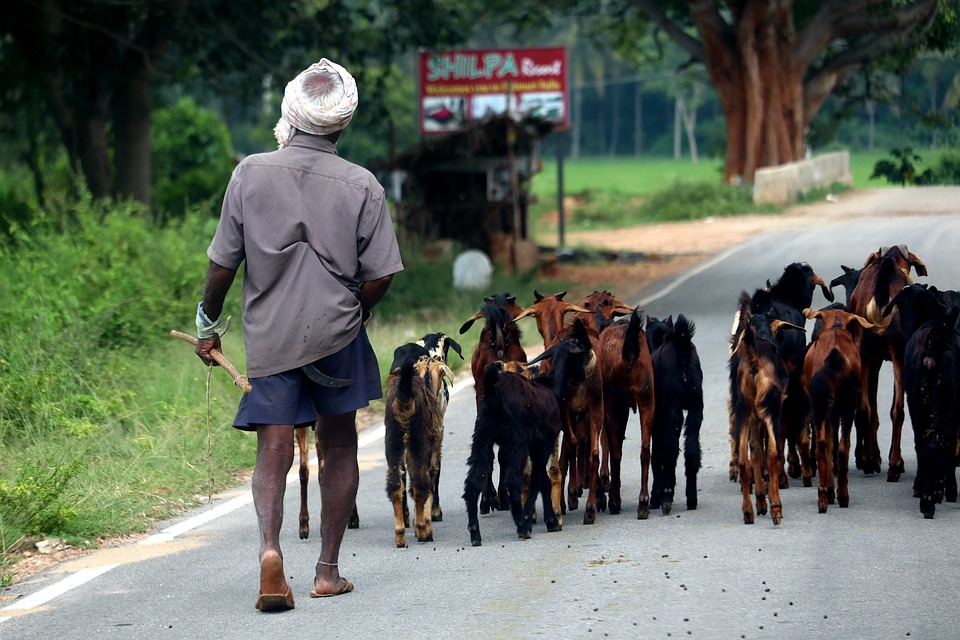The dairy and poultry industry was already reeling under losses because of the lockdown. Besides these, a large workforce associated with goat rearing has also been hit by the COVID crisis. As of now, the goat farmers are neither able to sell their goats nor they are able to manage fodder for them.
Neeraj, who lives in Abusar village in Jhunjhunu district of Rajasthan, is a Sirohi breed goat farmer. A breed of goat that is reared both for meat and milk production. He used to get many buyers from across the country.
But he has been reeling under losses since the lockdown. When Gaon Connection spoke to him over the phone, he informed us: “We sell goats for rearing purposes. Earlier, when these goats were in demand, we were able to manage fodder expenses for other goats with the earnings. But now since there are no buyers for these goats, how will I afford fodder for them?”
In India, goat rearing is practised by small to big farmers. Around three crore people are associated with the goat rearing in the country.
Goats are the main meat-producing animals. According to the Central Goat Research Institute (CIRG), about 942,930 tonnes of goat meat is produced in the country in one year.
Besides meat rearing, goats in India are also used for milk production. But since the lockdown, the sale of meat has come to a halt in many states of the country. This has caused heavy losses to the people associated with this business.
Swapnil Waghmare, who lives in Nagpur district of Maharashtra, buys goats from Madhya Pradesh and Rajasthan and sells them in the local market in Maharashtra. “We are dependent on this business as this is the chief source of income for us. I have been waiting for this lockdown to get over. Since the transport facilities have been stopped then how will we bring goats from other states?” asked Swapnil.
According to the data of the recent Livestock Census, the number of goats in India is 148.9 million. Of the total meat production in the country, goat meat production stands at 19%. According to the data of the National Dairy Development Board (NDDB), released in 2016, 5 metric tonnes of goat milk is produced every year. Small farmers contribute a major share in this production.
Mohammad Javed, a goat farmer, who lives in Dubbaga in Lucknow of Uttar Pradesh, gets goat buyers from Bihar and Calcutta. As of now, he is not able to sell his goats and it has become difficult for him to manage fodder for these goats. “The cost of goat rearing has doubled during this lockdown. If we used to spend Rs 15 per day on one goat, the cost has now doubled to Rs 30. It has become difficult for us to manage fodder for them. If this lockdown extends, we would suffer huge losses,” said Mohammad.
Many breeds of goats, including Sirohi, Beetle, Marwari, Barbari, Jhalwadi, are reared in different parts of the country. While most of them are reared for both meat and milk, some are reared just for their meat.
Vivek Singh, who lives in Uttar Pradesh’s Barabanki district, rears Barbari goats and used to sell goats to the goat rearers. “We have not suffered a lot because of this lockdown. Even if our sales have been affected, we would manage to sell our goats after four months. The only problem that we are facing is of fodder. We give mustard fodder to Barbari goats. We buy this from Urai market in Jalaun district of the state. But because of this lockdown, we have not been able to buy the fodder. Now, we have to feed them wheat fodder,” said Vivek.
Many small and big goat farmers eagerly await Eid as this is the time when selling goats reap them good profits. Besides, Eid, these goat farmers would make good profits during Holi. But this year, the sales were affected during Holi because of the corona pandemic and probably because of the lockdown during Eid. If the lockdown will extend till Eid, this would add woes to the goat farmers.
“We farmers wait for Eid as sales during this time increase. The government has allowed transport facilities for other essential services. Similarly, we could also be provided with permission so that we could also keep up our business during this time,” said Swapnil.
Many small farmers in Jharkhand, Chhattisgarh, Bihar, Madhya Pradesh, Uttar Pradesh and Rajasthan, take their goats for grazing in fields. But now they cannot take them out for grazing because of the lockdown.
India is the largest exporter of goat meat in the world. According to Agricultural and Processed Food Products Export (APEDA), India exported 18,425 metric tonnes of meat in 2018-19 worth Rs 790.65 crore. India exports meat to countries like UAE, Saudi Arabia, Qatar, Kuwait and Oman.
A market for goat farmers and buyers is set up twice a month in Rajasthan’s Ajmer. Many traders visit this market. However, this market could not be set up for more than a month now.
Jawaluddin Khan, goat farmer, who hails from Ajmer, has more than 50 goats in his farm. “Traders from many places come to the goat market in Ajmer. But this market is shut as of now,” said Jawaluddin, adding: “As other markets have been given permission to function, the goat market should also be allowed to start the trade. We will follow social distancing while going out. My goats used to produce 20 litres of milk every day. Earlier, we would manage to sell them easily. However, we are not able to sell milk now. I have no other option so I have started getting away with it by giving it to the local labourers.”



















